The Best Series Finales of the 21st Century, Ranked

Series finales are fickle things. Some of them have the power to redeem an entire show, to reframe the audience’s perceptions of what came before. Those massive twists rarely land, so more often than not, TV shows end not with a bang, but with a melancholy whimper.
And then there are the other times when a big series finale swing goes so awry that it can undo many seasons’ worth of goodwill. Recency bias rears its ugly head and some lifelong fans use these last episodes as a reason to sour on a particular show.
More from IndieWire
That’s why that the best finales don’t always come from the best shows. “Battlestar Galactica,” “How I Met Your Mother,” “Dexter,” and more often reached brilliance over the course of their runs, but rang less true with their final notes. Some of IndieWire’s choices below come from shows that wouldn’t normally rate as highly on lists of Great TV Dramas/Comedies.
But each of these picks left viewers with something meaningful that went above the rest of the show that came before it, all to make something worth remembering. The IndieWire picks for the best TV closing episodes of the century are below.
(It goes without saying that the reasons for our choices get well into spoiler territory, so consider yourself warned.)
Liz Shannon Miller, Hanh Nguyen, and Kevin Yang contributed to this list.
30. “Spartacus: War of the Damned”
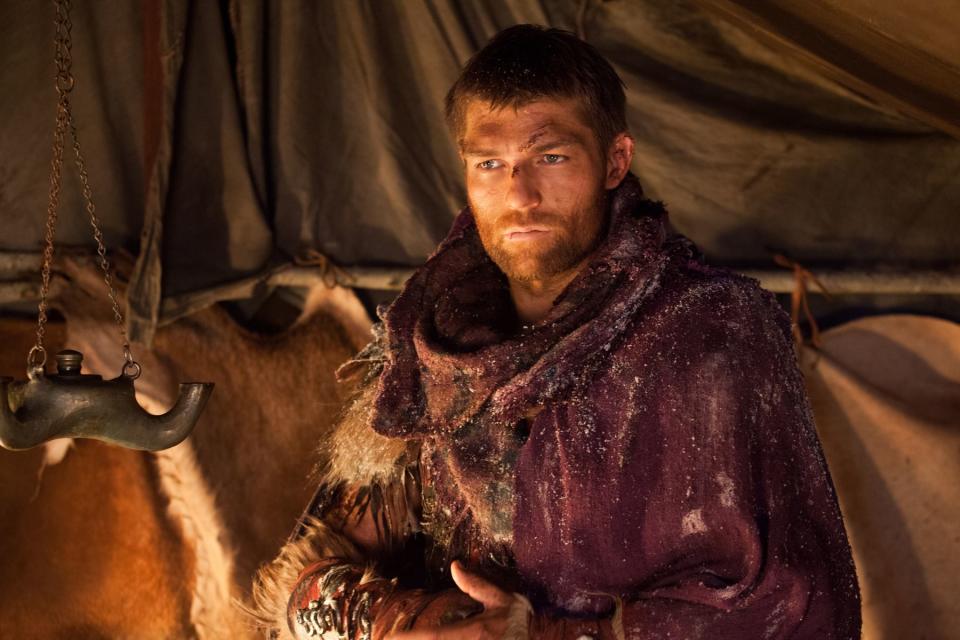
“Spartacus” had a fairly rocky start, but by the time the first season wrapped up with the stunning “Kill Them All,” it was evident that the series had found its groove. With just a fraction of the budget of the major networks, the series carved out its own visual style and consistently delivered battle sequences on an epic scale. It saved one of its best battles for last, pitting Spartacus and his remaining rebels against the Marcus Crassus-led Romans. The battle was beautifully choreographed and filmed, but it succeeded on such a scale because it was driven by raw emotion. Even though history dictated the outcome of the battle, we couldn’t help but hold our breaths, hoping Spartacus would somehow defeat Crassus even as it became clearer and clearer that he wouldn’t. However, the series still ended on a moment of quiet celebration, assuring us that Spartacus’ legacy would never fade.
29. “Person of Interest”
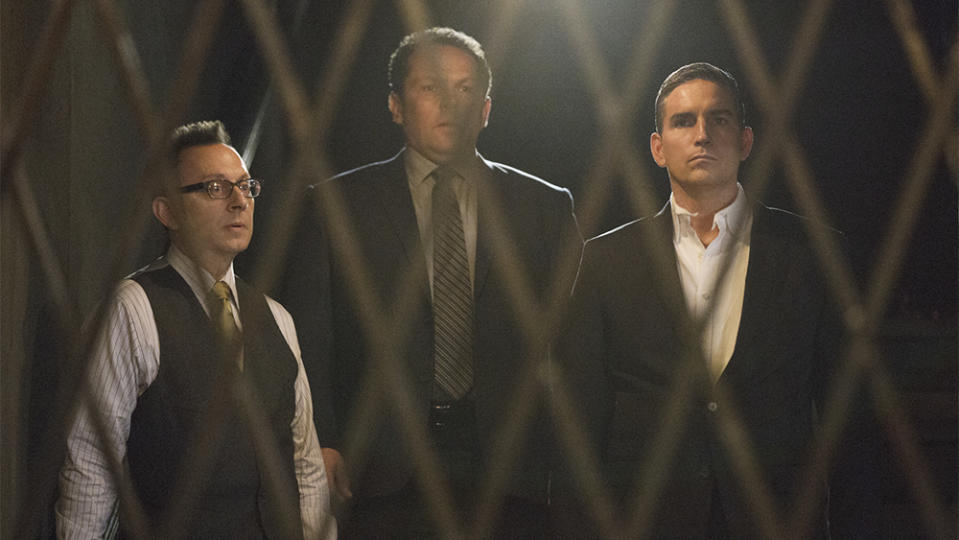
“Person of Interest” began as a typical crime procedural, but it ended as a complex, serialized science fiction show that found the humanity within technology. Though the finale had no shortage of action, it tied up the series so well because it focused on the reflective moments in between. The Machine’s ruminations on death and legacy took center stage, highlighting the connections that were forged and people who were saved over the show’s run. Reese’s sacrifice on that rooftop was a fervent expression of the very essence of the series: the impossibility of severing the human from the machine. It wasn’t just about The Machine or Samaritan. It was about the humanity that endured, even if the physical bodies were no longer with us. Who wouldn’t want Amy Acker around forever, anyway?
28. “Sex and the City”
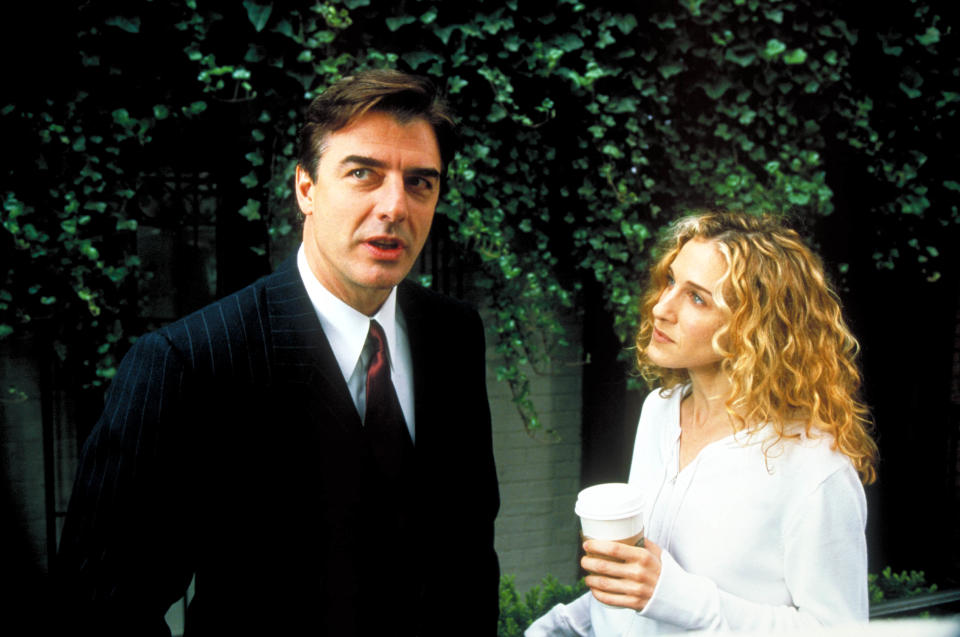
Is a finale still a finale when it’s followed up by two movies (one great, the next awful)? In short, yes: Just like any series finale could suddenly become just another season finale if the Revival Fairy comes a-callin’, the O.G. “SATC” ending is still the best. After making audiences believe Carrie’s (Sarah Jessica Parker) fate was tied to turbulent Russian artist Petrovsky (Mikhail Baryshnikov), the two-part finale sets up a romantic wooing that’s trickier than it seems after the first half-hour. Yes, Big (Chris Noth) is on his way to Paris to win back the woman of his dreams, but how can a seven-year on-and-off romance be resolved in less than an episode? How can Carrie be ready for a man the audience couldn’t agree she even wanted? Then there’s the slap, which not only crosses a whole bunch of lines, but wakes Carrie up to the reality of her situation. She’s not meant to be with Petrovsky and just as importantly, she’s not meant to be in Paris. “Sex and the City” made Big even bigger in its final episode, as he came to represent the city of New York and all of Carrie’s deepest loves. It resonates, and so does the finale — even after that second movie.
27. “Dollhouse”
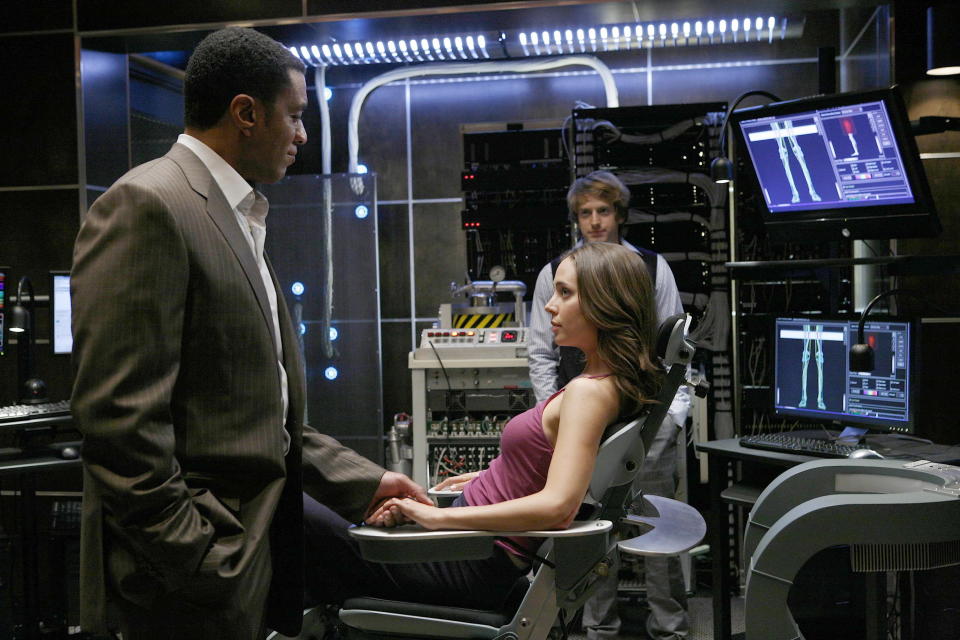
In “Epitaph Two: Return,” the show flashes forward to the bleak future seen in the first season’s unaired episode “Epitaph One,” in which the city is a war zone in ruins. Battles ensue, sacrifices are made, and even a secret love child is revealed. What saves this from dystopian soap — dysoapian? — are the technologically satisfying endings: one that reverts each doll to their original personas, and a bittersweet one that pre-dates “Black Mirror’s” concept of taking on a loved one’s persona into oneself, never to be parted. “Dollhouse” may have had its issues, but it proved right through to the end that it was a fertile playground for strange and innovative ideas.
While the Joss Whedon series began with a problematic tone — framing the “doll” operatives as if they were some idealistic super spies or fantasy wish fulfillment — once the show shifted to take a stance against such human trafficking and abuse, it started to get good and explore deeper themes about identity and humanity. Some of the series’ most emotionally honest episodes occurred in Season 2 (see Dichen Lachman’s turn in “Belonging”), when the show began to widen the scope of its storytelling. Which is why it’s a shame that this was its last season.
26. “30 Rock”
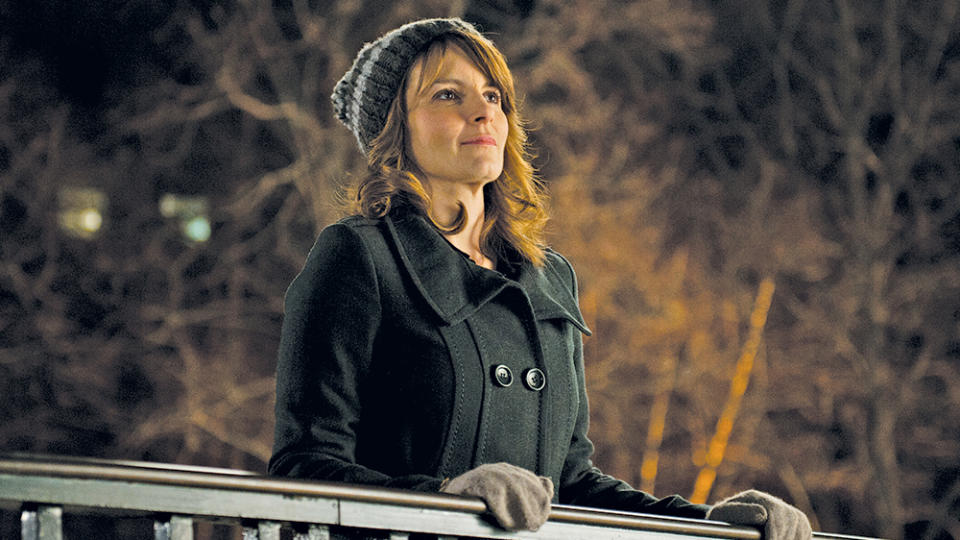
There’s so much packed into this last installment, which manages to establish emotional denouement for nearly every character of the show’s ensemble. But there are two reasons it had to make this list. One is the slightly silly but also profound final scene, which pays off years of joking about Kenneth the Page’s immortality while also bringing things around full circle in a deeply satisfying way. But more importantly, there’s the final confrontation between Liz (Tina Fey) and Tracy (Tracy Morgan) at the strip club they visited during the pilot, which is a scene that lingers in the memory, as a beautiful and honest acknowledgment about how adult relationships work, especially at the workplace.
“We were forced to be friends because of work. And we’re probably not gonna hang out after this, all right? You’ll say that you’re gonna invite me to your house, and it’s never gonna happen,” she says. “Tracy, you frustrated me, and you wore me out. But because the human heart is not properly connected to the human brain, I love you, and I’m gonna miss you.” With those words, Fey reminded us that the ending of things, whether it be shows or relationships, doesn’t diminish them, and that the real tragedy would be in refusing to let something go.
25. “Barry”
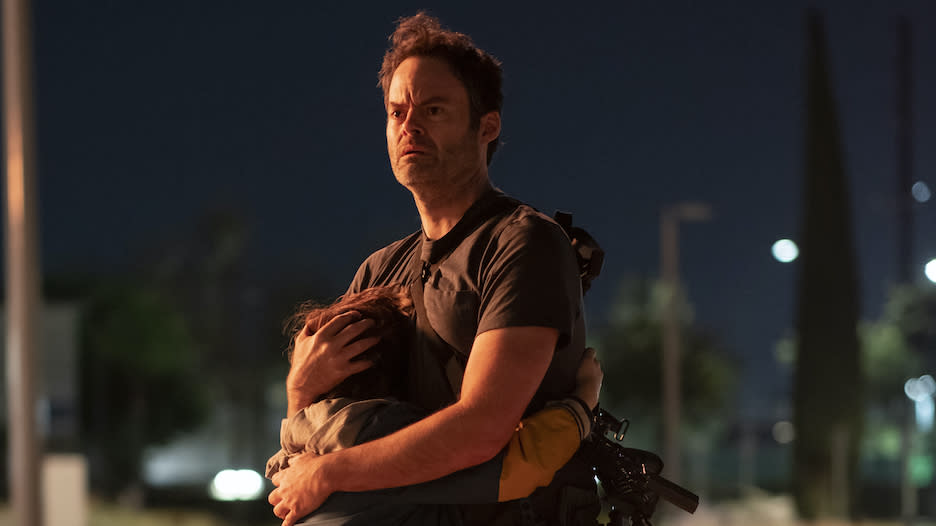
To call it a Hollywood ending wouldn’t be wrong, but it may imply a net positive that doesn’t exist in Bill Hader’s black-comic existential odyssey. Posing questions like, “Can people change?” and “How does one earn redemption?” aren’t typical practice for half-hour comedies (or, at least, it’s not typical to pose them so bluntly), but “Barry” earned its serious moments through its steadfastly honest portrayals. Fuches (Stephen Root) provides a foundation for the finale and a perfect capper to one of the TV legend’s greatest roles. Sally (Sarah Goldberg) comes out the other side in a way that’s authentic to her journey, yet empathetic for a character deserving that level of love. NoHo Hank (Anthony Carrigan) goes out holding the hand of his beloved, in a way, while Gene does what he feels he must — and pays a steep price. Barry does, too, accepting his fate before fate deals him a harsher hand — and before he can convey to his son what really happened to him.
As a teenage John watches the Hollywood version of his dad’s days in La La Land, he takes comfort from the misguided story’s heroic portrayal of Barry. That it’s not what really happened makes you wonder what’s next for John: Will he listen to his mom when she tells him the truth? Or will he believe the lie fed to millions on screen? And what of Barry and Gene? One ruined so many lives, but will live on as a redeemed fictional version. The other was largely a victim, but he’ll be remembered as a monster. Neither fit the bill for a Hollywood ending, but that’s what they are. In its ending, “Barry” offers no easy answers, and that’s very purposefully because they so rarely exist. —BT
24. “Man Seeking Woman”
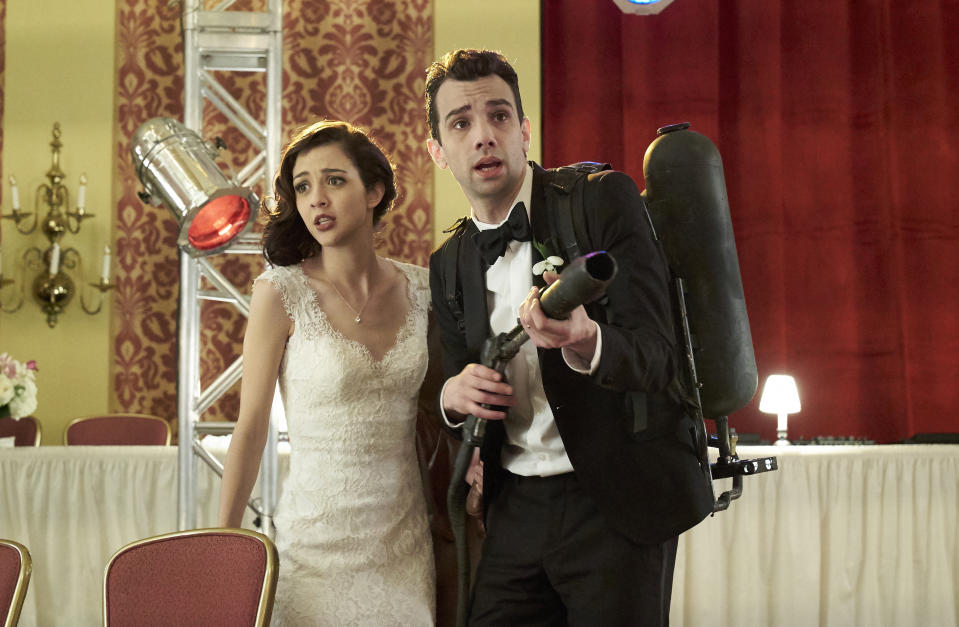
A show that already had a specific brand of melancholy romantic foibles made the leap in its third and final season when the adventures of Josh gave way to the adventures of Josh And Lucy. Both Jay Baruchel and Katie Findlay sent off their characters in style in a wedding episode that captured all of the anxieties of commitment and family and the future all at once. It may not be the best episode of the season (that honor goes to the proposal episode “Bagel,” which made IndieWire’s list of the Best Episodes of 2017). But this farewell gave such a grounded acknowledgment that even life in a fantasy world, the real value comes in who’s fighting those battles alongside you. After a series run that found some of the best ways to stick some real human moments in the absurd, the series’ final moment, of the two kissing in a bright ray of sunshine in the middle of a rainstorm, is a beautiful little allegory to end with.
23. “BoJack Horseman”
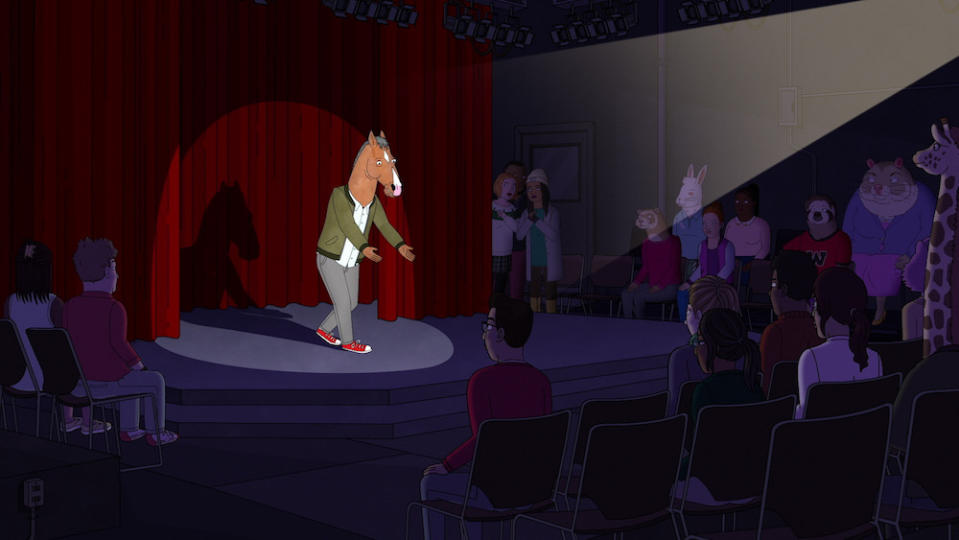
Perhaps what I love most about the “BoJack Horseman” series finale is how it works as an homage to the genre it loves and the genre it is: the sitcom. There’s a flash-forward, a seminal event, a reunion of characters, and even the cuts to black (as though a commercial is about to play) all embody the form of so many sitcom endings. Creator Raphael Bob-Waksberg spoke early and often of his love for ’90s sitcoms, which allowed him to not only reference them with hysterical specificity, but make a great “Horsin’ Around” episode all his own. (See: The 2014 “BoJack Horseman Christmas Special.”) Yet, even with all that evident adoration for what makes sitcoms so rewarding, the silent final moments and their subject matter speak to the series’ dramatic foundation. Unlike “Horsin’ Around,” “BoJack Horseman” never promises that “no matter what happens, at the end of 30 minutes, everything is going to be OK.” The series confronts addiction and depression head-on, often with a clarity and courage few other shows could emulate, and it lets its audience sit with the weight of life in a way that’s accessible, identifiable, and honest. “BoJack” remains the rare series that could do it all: climb to comedy’s most absurd heights and earnestly explore the depths of drama. Its ending pays respect to both, while holding a special place for its one true love. —BT
22. “Justified”
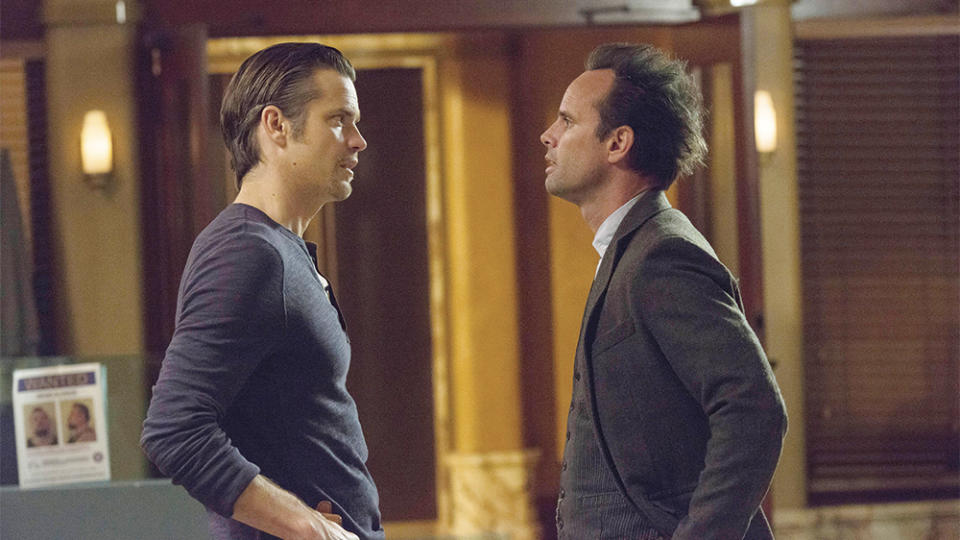
“The Promise” didn’t strive for a huge, climactic finale. It worked because it stayed true to the series, which made a name for itself by tackling big questions in a suave, laidback manner. A chief question of the final hour was whether or not Raylan Givens would be able to leave Harlan alive, literally and figuratively. The answer to both? Yes. The series concluded his story by allowing him to unshackle himself from his past, moving beyond Arlo’s shadow and away from Boyd’s life of crime. The real gem of the finale was seeing Raylan and Boyd reunite four years down the road, smiling at each other from opposite sides of a prison glass window. After all, they were always meant to be. In a series that prided itself on its dialogue, the line that resonated the most was the one that brought it all full circle: “We dug coal together.”
21. “Life on Mars” (U.S./UK)
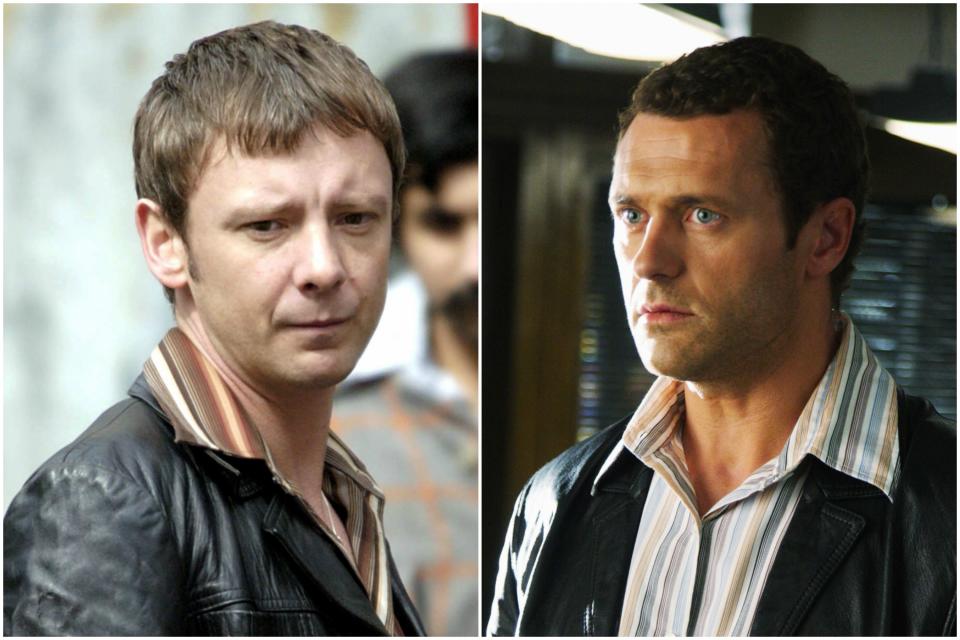
We’re lumping the British series and its American spin-off together on this list, but to be clear: They’ve each earned this mention for very different reasons. The original series, which ran for just two seasons, was the perfect length and ended with a perfectly executed finale; after 16 episodes, the show had revealed the true reason why Sam Tyler (John Simm) had been sucked back in time to 1973, and also made it very plausible as to why (and how) he might wish to return to that era. It’s both dark and hopeful, a happy ending that represents a fascinating level of bleakness, and also still features plenty of Gene Hunt (Philip Glenister) being the magnificent bastard we came to love.
Meanwhile, the U.S. version premiered after the end of the UK series, and though American audiences might not have been familiar with the original version, the writers certainly were — and clearly felt the pressure to do something different when it became clear the show would not be returning for a second season. And holy crap, did that series finale take a different approach. Honestly, it’s something you literally have to see in order to believe. Just know that as bonkers as you might predict it to be, the American “Life on Mars” finale will exceed those expectations. And we admire the hell out of it for trying.
20. “Veep”
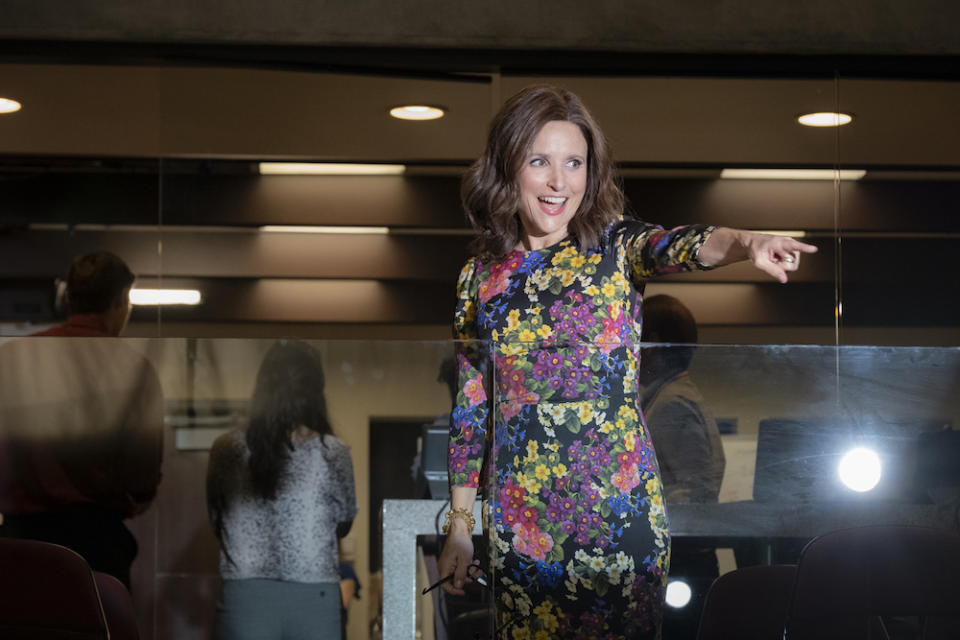
Heartbreak isn’t what often comes to mind when remembering “Veep,” Armando Iannucci’s vicious political satire. But in the series finale, writer-director David Mandel worms his way into Selina Meyer’s hardened heart just long enough to see it shatter. For seven excellent seasons, Julia Louis-Dreyfus’ perpetual also-ran fights for the nation’s top seat, and for six seasons and six episodes, she falls short. Along the way, moral sacrifices are made — by Selina and her staffers — all under the guise of doing more good once they’ve reached the highest office. But the pursuit of power, especially in the American political system, requires more than they could’ve ever imagined, and “Veep” (the title of the finale) sees Selina break ties with a boyfriend her strategists say she can’t win with, trade her vice-presidential seat to her long-time whipping boy (and all-around awful person) Jonah Ryan (Timothy Simons), and, worst of all, selling her beloved assistant Gary (Tony Hale) down the river, all so the V.P. can finally move into the Oval Office. All that being said, even a tragic “Veep” ending is still a hilarious “Veep” ending, and Selina’s flash-forward funeral features a cameo for the ages. —BT
19. “Succession”
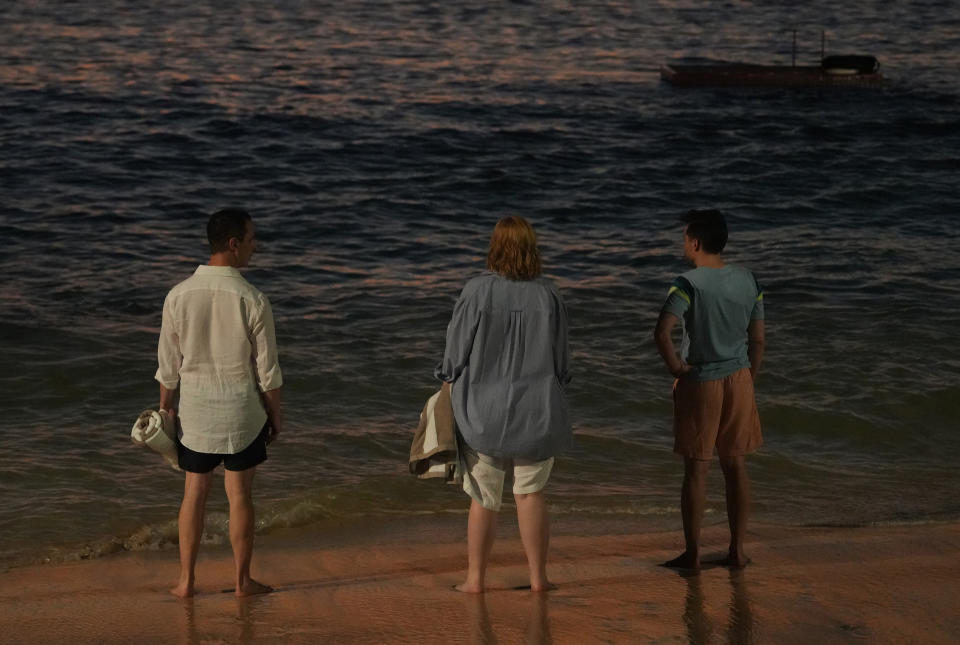
Even Logan Roy’s legacy proves too powerful for his children to usurp. The “Succession” finale features plenty of twists and turns, surprises big and small, but it largely sacrifices major shocks for hard truths. Kendall (Jeremy Strong), Shiv (Sarah Snook), and Roman (Kieran Culkin) were bred to compete with each other, not to love each other; they were pawns on a chessboard of their father’s making, and even when he’s left the table for good, they can’t help but move as they’ve been built to move. In other words, they combust. Their unified front falters, and their mission collapses along with their lives. Creator Jesse Armstrong makes clear that none of the trio are happy in the end; none of them get what they want, and all of them have to live with the consequences of their various failures. Yet sharper still, the series finale makes clear that these abused and manipulated children are but a minor footnote in the history books. The world they want to control moves on without them, as uncaring and unencumbered as their father — more so, even. Their money will keep them from facing any real hardship, but in the end, their money is all they had. Not their jobs, not their father, and not each other. “Succession” is a personal tragedy framed against terrifying global trends. Congrats to Tom, I guess. —BT
18. “Review”
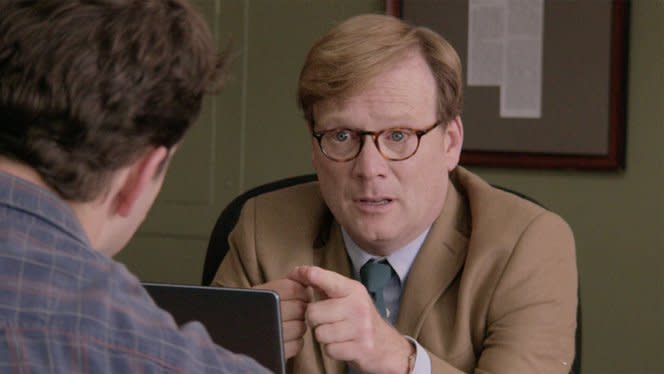
“Review” is notable for delivering a final episode that that was a surprise outside the normal “this season finale is actually the series finale” way. Closing up shop on the series after just the third episode of the Season 3, “Review” captured Forrest MacNeil scrambling to find meaning in his show being canceled. For “Review,” it came at a perfect time after there were no more worlds left to conquer. You can go to space, start your own death cult, and murder someone, but there’s only so much room to go from there. Left to ponder the meaning of life without a central purpose, Forrest ended the show in the only way that he knew how, by continuing to do so. As his life continues to crumble and his office is literally dismantled around him, it’s the perfect encapsulation of what made the show such a twisted stroke of genius: Forrest’s own self-destructive doom is the only thing that made him truly happy.
17. “Angel”
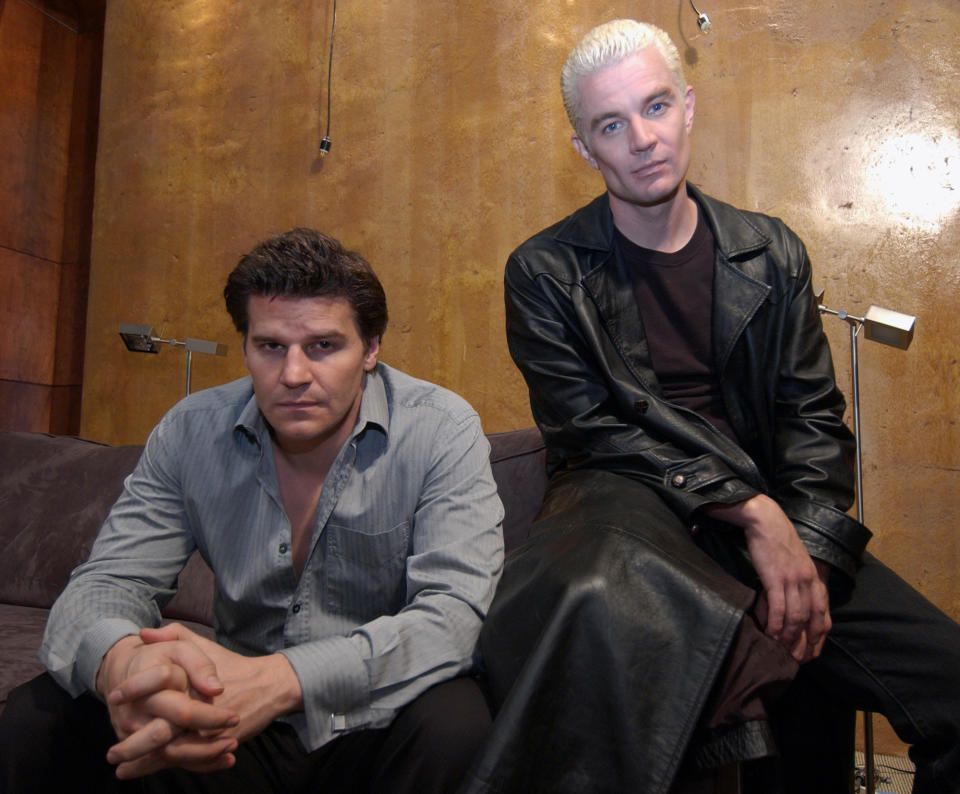
There are two Joss Whedon finales on this list, and they both represent times when he felt no need to set up the series for future stories — meaning that he felt no compunction whatsoever about burning the mo-fo to the ground. Technically, the final moments of the “Buffy the Vampire Slayer” spinoff function as something of a cliffhanger, but really, it’s pretty clear that Angel (David Boreanaz) and his compatriots are in dire straits. Yet, they’re still fighting, right to the last — a perfect final note for a show that was always about how tough it can be, to keep the struggle going when the odds are against you.
16. “Friends”
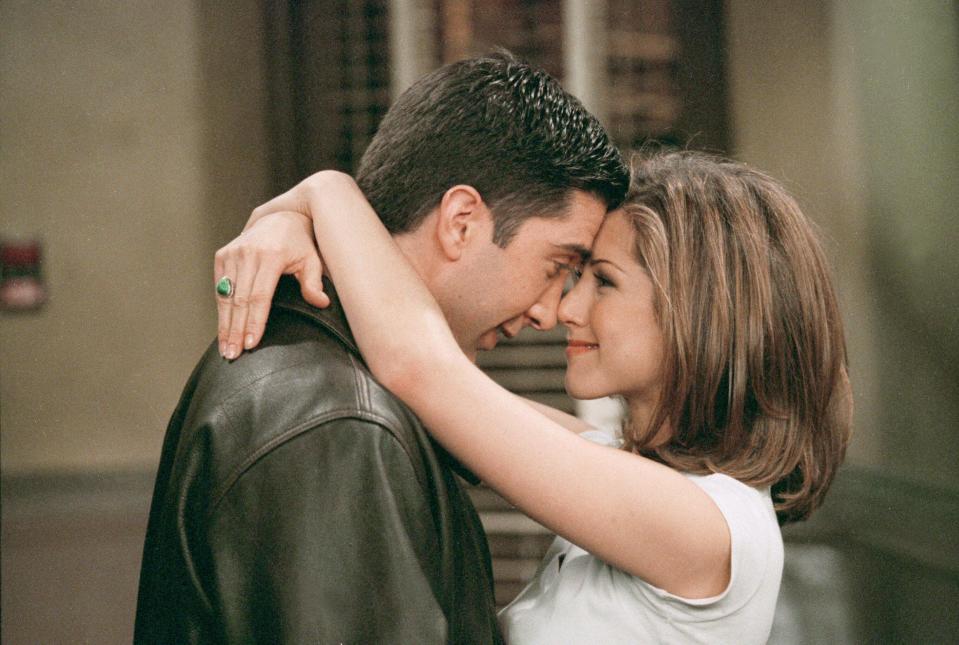
The “Friends” finale may feel cliched today, but it set the standard for sitcoms built around a core romance — and none of the show’s imitators or spiritual successors have done it better. Monica (Courteney Cox) and Chandler (Matthew Perry) finally have the baby – check that — babies (surprise!) they’ve always wanted. Joey (Matt LeBlanc) and Chandler have one last adventure with the foosball table (and new chick and new duck). Though none of the ensemble gets short shrift, everything pales in comparison to Ross (David Schwimmer) and Rachel’s (Jennifer Aniston) will-they-or-won’t-they conclusion. It’s not that they end up together. It’s not that they save the final decision until the very end. It’s that writers David Crane and Marta Kauffman stage a romantic, surprising, and emotionally authentic scene to amp up the humor and tension of a decade-in-the-making moment. Ross would never know what he had to do until the last second, and Rachel deserved more than forcing the issue (yet again) herself. He made the gesture, and she made the choice. He drove to the airport (OK, Phoebe did), and Rachel got off the plane. It may feel familiar now, but you still feel every second of the finale. It works, and it works beautifully.
15. “The Shield”
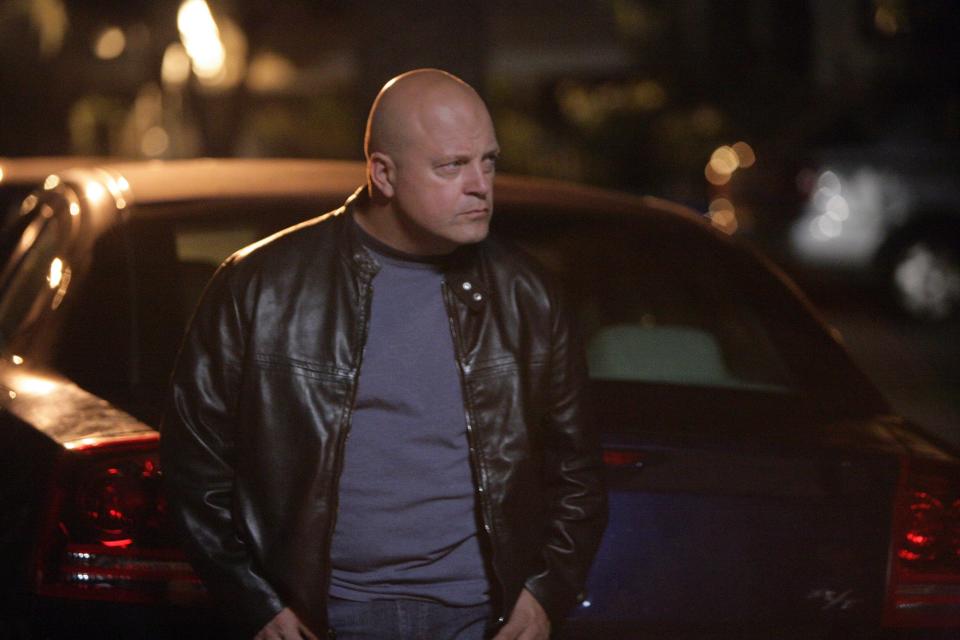
Punishing and fitting in equal measure, “Family Meeting” delivered a humiliating blow to its main character just by relegating him to a desk job. In an ironic turn of events, Vic Mackey was given immunity, but his friends ended up either dead (including Shane Vendrell in one of the more difficult to watch scenes of the series) or in jail, and his family left him for witness protection. He didn’t even get to say goodbye to his children. For Vic, this was a fate worse than death. Utterly alone and broken, he was taken off the streets on which he thrived and forced into a suit that made him look small. You almost feel bad for him until you realize he deserved every bit of that punishment, and therein lies the tragic brilliance of the series finale. For a show so built on suspense, action, and momentum to end with silence was a gutsy move, but it was thoroughly satisfying in its own unique way.
14. “Hannibal”
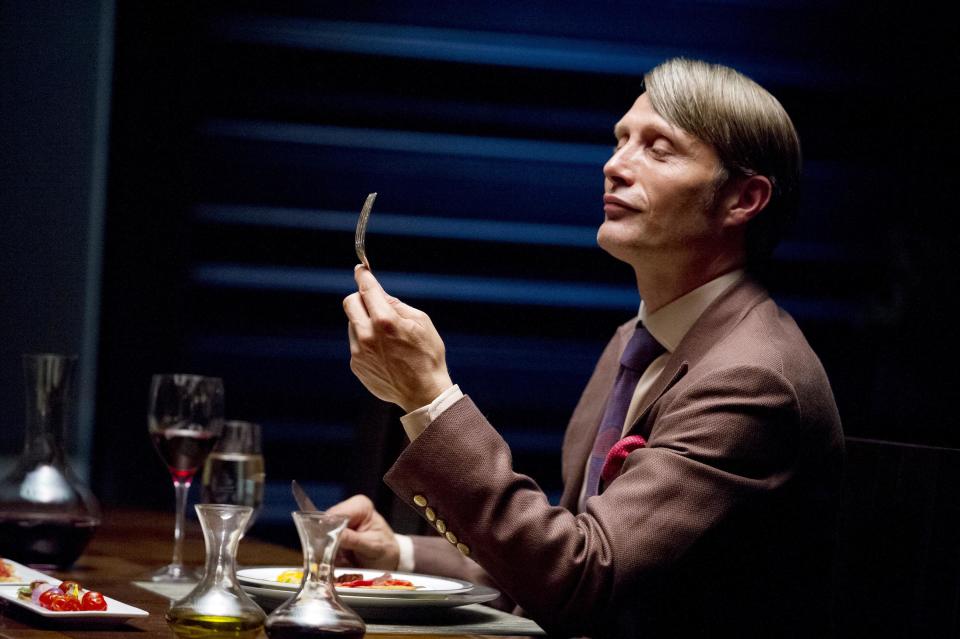
Bloody, bold, and unbelievably twisted, “The Wrath of the Lamb” was the epic ending that the show may not have deserved (because we all know it deserved a Season 4), but nevertheless satiated fans’ appetites. The majority of the episode is delicious setup as, course after course and scene after scene, we see Will (Hugh Dancy) put into motion a plan that will free Hannibal (Mads Mikkelsen) temporarily in order to be used as bait to catch Dolarhyde (Richard Armitage).
The rich, lip-smacking main course, however, is the final rooftop confrontation in which we see Will and Hannibal work in concert to take down their common foe, the one who would keep them apart. It’s only because of the intimacy of their bond and their macabre mental connection that they’re able to triumph…. together. Their weary and blood-soaked embrace is as much about affection as it is acceptance. “See, this is all I’ve ever wanted for you, Will… for both of us,” says Hannibal, summarizing the murder husbands’ push and pull over the seasons. And speaking of, one last pull sends the duo over a cliff to an uncertain fate. While the post-credits coda (or dessert) features Du Maurier with her severed leg served up, glistening and golden from roasting, it’s implicit who might be joining her to share in the most personal of repasts, if only in spirit.
13. “Lost”
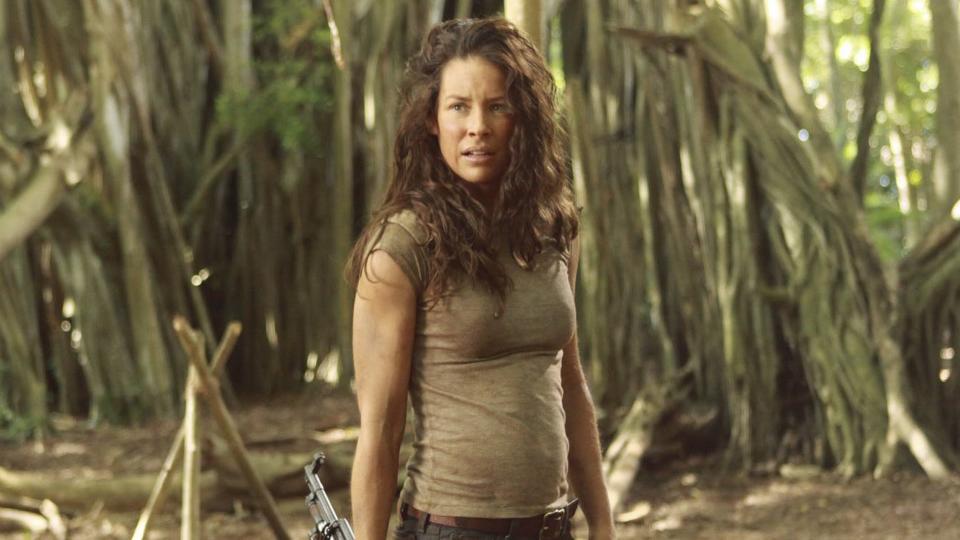
One of the more maligned final chapters in TV history, this episode doesn’t get enough credit for finding a human center in a show that had been pulled in a million different directions. “The End” built toward a heightened surreal gathering place for the many characters who had woven through the show’s six seasons. That final act of communal appreciation, before whatever comes next, may have come inside a place of worship, but it captured the idea that what gave these characters hope was faith in each other, not necessarily any specific entity or tradition. Whether tied together by divine intervention, fate, or chance, the survivors of flight Oceanic 815 were always going to be bound together, be it the characters in the show or the actors who played them on screen. Gathering all of these people together — well, at least most of them — was the culmination of a season-long reunion that gave life to the idea that no matter the circumstances, some unifying force would find a way to bring loved ones and compatriots together in some way after life on Earth. It might be overly sentimental, and it might not be a satisfying ending for those who lean more towards the former part of the “science vs. faith” debate the show always engaged with. Leaving the audience as it made that final case might be the finale’s greatest weakness, but is undoubtedly its greatest strength, too.
12. “Rectify”
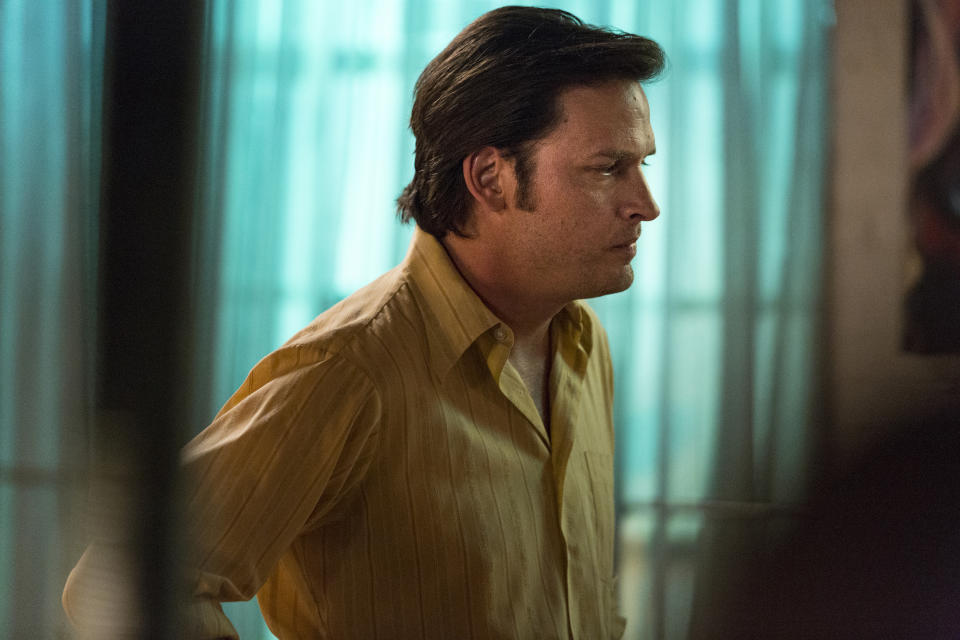
Answers are often sought, even if they’re not what’s needed. “Rectify” opened on Daniel Holden (Aden Young) being released from prison after 19 years on death row. There was just enough new evidence to get him out, but not enough to say he positively didn’t kill Hanna Dean nearly two decades prior. So for four beautiful seasons, Daniel and his family wrestled with the ramifications of his time in captivity, his questionable reputation (and mental state) upon release, and, yes, the question of whether or not he really did do the deed. (He was too messed up to remember what happened himself.) The finale didn’t offer any concrete solutions; it didn’t reverse the restrictions that came before and give Daniel some inexplicable moment of clarity. It did something even more miraculous. In the final hour, Ray McKinnon’s soulful Southern series defines the souls of its characters. It makes you feel like you know each and every one of them in such a way that you can trust your own beliefs to guide you from that point forward, just as Daniel does, too. For the first time, he’s truly free. And it’s magnificent.
11. “The Wire”
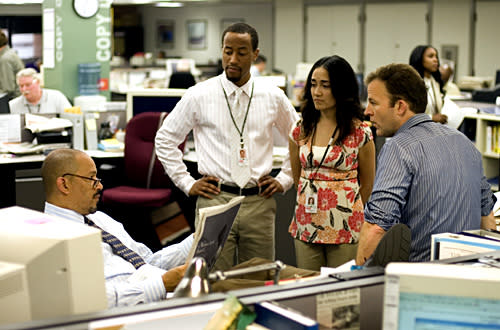
Say what you will about the fictionalized serial killer arc dominating Season 5, the “Wire” finale is filled with moments (big and small) that speak to the series’ penchant for truth. Prezbo (Jim True-Frost) trusts one of his former students, Dukie (Jermaine Crawford), with money to start a new life, only to see him use it for drugs. Bubbles (Andre Royo) is skeptical of Mike Fletcher’s (Brandon Young) profile of him in The Baltimore Sun, but it forces him to recognize his own goodness, arguably saving his life (and getting him in the same room as his sister). Daniels (Lance Reddick) gets promoted to Commissioner by playing the game, only to step down from the position in standing up for his principles. McNulty (Dominic West) gets the wake he’s always had coming. Carcetti is elected governor. Spider takes over Bodie’s corner. An honorary Omar emerges. “The Wire” finale provides an ending without finality for a city in the same condition. It indicates where its characters are headed without cementing their future, just as it does for Baltimore as a city and America as a whole. Both a satisfying season ender and series finale, “The Wire” effortlessly brought together its big ideas for a close that resonates to this day. And for the record, we like the serial killer plot.
10. “Better Call Saul”
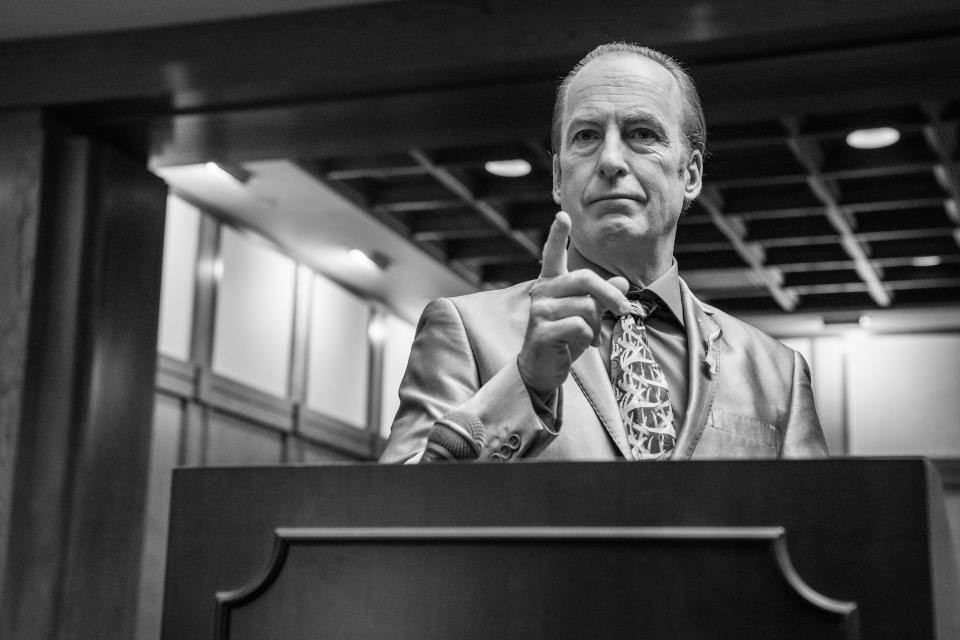
Following up “Breaking Bad” is one thing, but following up the ending to “Breaking Bad” is a whole other kind of pressure. Vince Gilligan and Peter Gould’s original series built to a poetic conclusion; one built into the show’s starting point. Their spinoff lacks the same luxury, as Jimmy McGill’s journey to Saul Goodman doesn’t come with an implied expiration date. Still, “Better Call Saul” found new life in its central relationship between the titular con artist/lawyer (played by Bob Odenkirk) and his soulmate, Kim (Rhea Seehorn). Through their partnership, the series examines regret and redemption, but also what makes life worth living. Within that questioning is a fitting parallel to Walter White — one acknowledge in the finale’s opening scene and reassessed in its closing moments. Living for the next con — for the sake of getting away with it — doesn’t provide much long-term value, but a life without risk also goes without a suitable reward. —BT
9. “Breaking Bad”
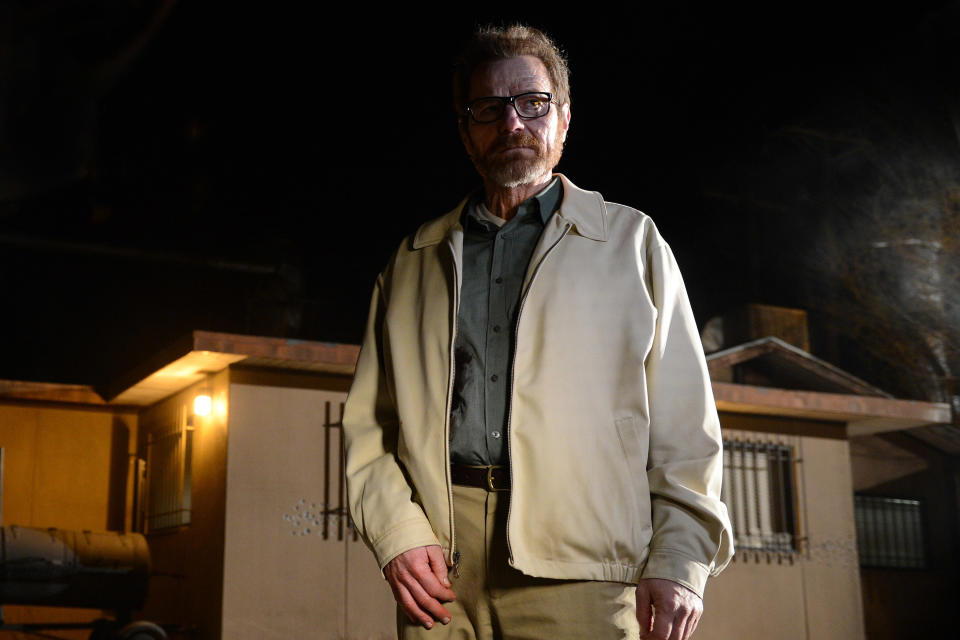
Perhaps one of the most adeptly balanced and crafted finales ever, “Felina” brought all the closure viewers wanted while also slamming them with the emotion they needed for a truly complete experience. It was note-perfect from start to finish, even including the music, beginning with “El Paso” and ending with those last lyrics heard in Badfinger’s “Baby Blue”: “Guess I got what I deserve … /That special love I have for you/ My baby blue.”
But really, just seeing Walter White go out on his own selfish terms (he finally admitted it) in a blaze of bullets and glory, was as satisfying as one could’ve hoped for. And then the show gave fans one more high: a reprieve for Jesse after a farewell scene with Walter. It was almost, dare we say, uplifting? Detractors may not have liked everything being tied up so neatly, but to those critics, we say: Boo, bitch!
8. “Twin Peaks”
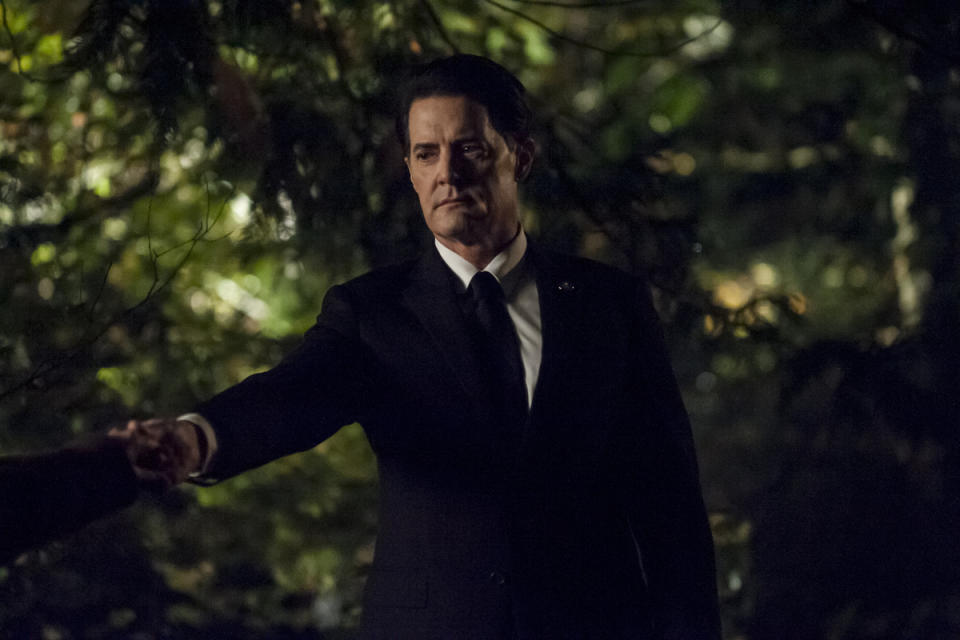
Back when viewers first thought the show had ended in the ‘90s, “Twin Peaks” had left on a massive cliffhanger, and the film follow-up “Fire Walk With Me” unfortunately didn’t really wrap things up. As for the Showtime revival’s finale, well, it didn’t really bring the expected closure either. But when did David Lynch and Mark Frost do anything that was expected?
What the show’s return did accomplish, however, was balance some of the more traditional narrative elements — solving the mystery of a missing woman and vanquishing a foe — with a full-fledged plunge into a freaky but consciousness-expanding adventure that undid everything that came before. The creation of a new timeline posits that the reality we once knew itself might have been just one conceivable outcome. And yet, despite the nightmarish last note, the series ended with hope because of the very fact that it upended the formula of what we thought was possible.
It’s a satisfying end in that we can imagine these characters living on, continuing their journeys on a plane that we may not see, but trust is out there. When Agent Cooper says, “We live inside a dream. I hope I see all of you again. Every one of you,” we can take comfort in that farewell.
7. “The Americans”
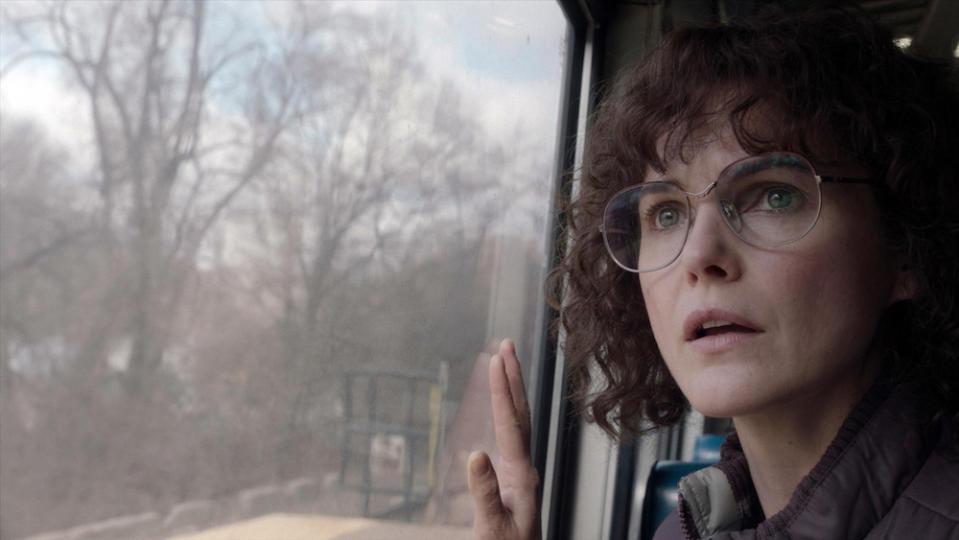
Joe Weisberg and Joel Fields’ FX espionage drama played out beautifully as both a tense, unpredictable thriller and an intimate, complex family drama. Its ending, winkingly titled “START,” provides ample closure to the latter while honoring the oft-ambiguous nature of the latter. For spies, missions come to end, but for parents, you’re parents for life. So when Philip (Matthew Rhys) and Elizabeth (Keri Russell) escape to Russia, their survival proves bittersweet. They have their lives, their freedom, but they have to leave one child behind, since Henry (Keidrich Sellati) never discovered their secret identities, and their eldest, Paige, chooses to remain in America, deciding it’s more important for her to look after her brother than to stay with her parents — a choice that illustrates her maturity as much as it hurts a mother and father facing a difficult adjustment to life back in Moscow. The finale trusts its impeccable cast to convey the script’s ample complexities, just as it trusts its audience to be as content with ambiguity as they are with answers. Not every story ends neatly, but “The Americans” found an ending that fits very, very well. —BT
6. “Halt and Catch Fire”
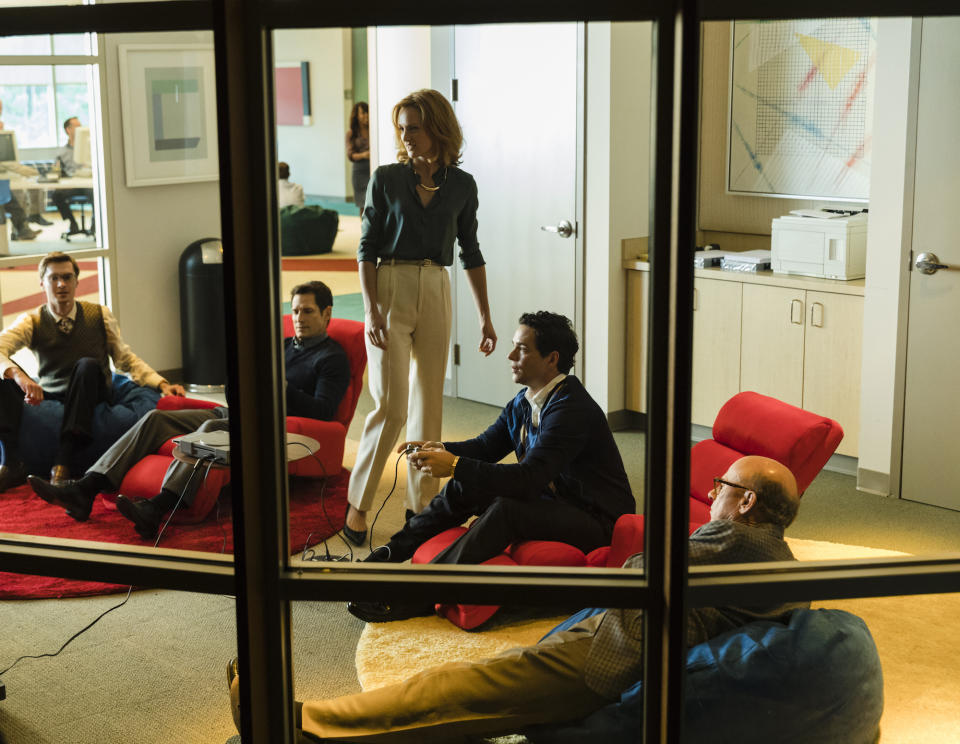
As IndieWire said in our review, there aren’t a lot of TV shows that could get away with ending on a Peter Gabriel song — especially “Solsbury Hill” — but then there aren’t a lot of shows like “Halt and Catch Fire.” Christopher C. Rogers and Christopher Cantwell’s earned the overused strumming with one of the most earnest, subtle, and human dramas ever made; so much so that the song’s original power returned in full when it closed out the show. Of course, it helped that the ending also served as a beginning, but that delicate transition demands more words than we have to spare in this blurb. So let’s just say “Ten of Swords” kept its focus on what made the series great: the people and their dreams. It hinted at what they could do without forcing concrete conclusions, as the writers recognized that dreaming is the fun part for Cameron (Mackenzie Davis), Donna (Kerry Bishe), Gordon (Scoot McNairy), and Joe (Lee Pace). All it takes an idea, and anything can spark it — even an old song heard anew.
5. “The Sopranos”
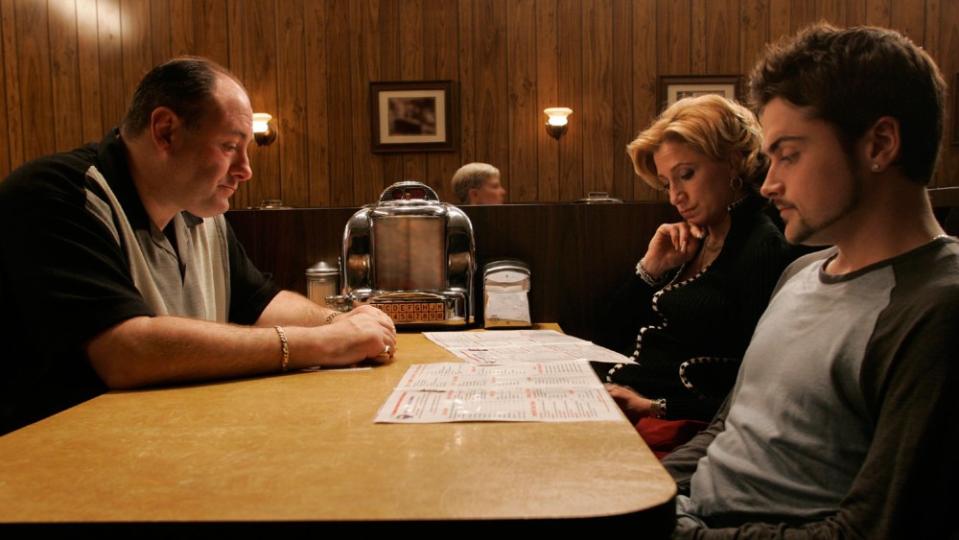
We never knew that a moment of silence could be so deafening, until Journey’s “Don’t Stop Believing” cut out, mid-chorus, and an entire nation leaped off the couch screaming “WHAT?” The last scene of “Made in America” changed television forever, mostly because it made it clear that television could do whatever the hell it wanted, including refuse to satisfy our expectations.
After all, going into the “Sopranos” series finale, everyone was pretty sure a bloodbath was looming, but instead “The Sopranos” defied any expectations of finality, ending with many members of Tony’s (James Gandolfini) crew compromised or worse, but the core family unit — Tony, Carmela (Edie Falco), Meadow (Jamie-Lynn Sigler), and Anthony Jr. (Robert Iler) — still alive and together. Debate around what that ending means ebbed and flowed in the 11 years since that original airing, but one thing is for certain: “Made in America” made sure we’d never stop talking about it.
4. “The Leftovers”
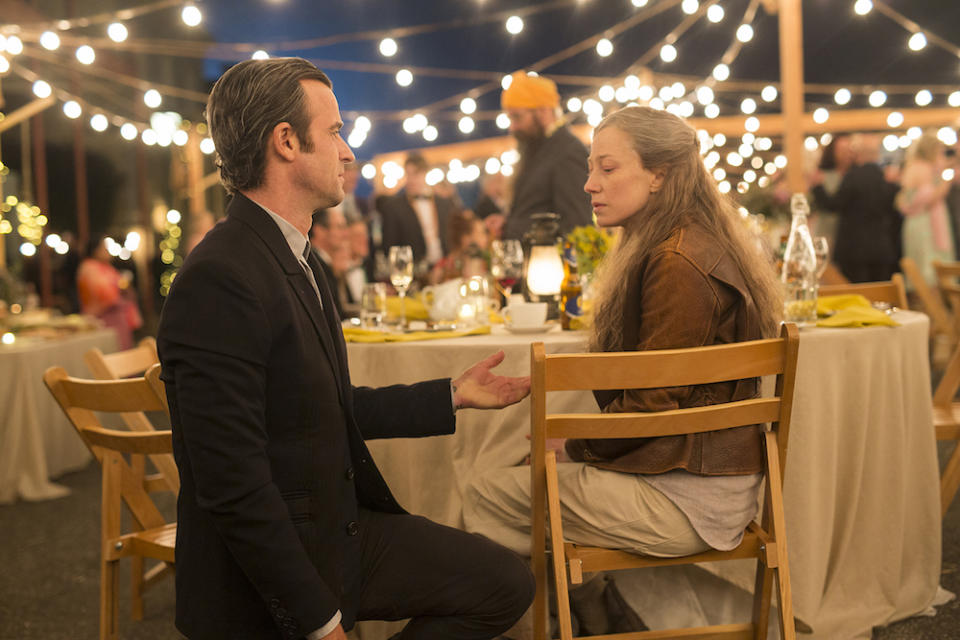
It was Kevin and Nora in the end. The series began with a look at belief systems on an organizational level, i.e. through the Guilty Remnant, but it drilled deeper and deeper until it ended with a smaller and more personal note of faith. As Kevin and Nora sat across from each other at that table, the series asked us not necessarily about faith in a higher power or meaning, but rather faith in the people around us. Whether or not Nora’s story was true, what mattered was that Kevin chose to believe her. He believed in her as a human being, as a partner, as someone he could live with and fuck up with for the rest of his life. Conversely, Nora believed in Kevin, just like Laurie believed in her kids and Matt believed in Nora. “The Book of Nora” was a finale about finding connection and love in the midst of a bleak and unforgiving world, about believing in the person sitting across from you enough to simply let the mystery be. It was a finale about finally being able to take stock of your situation, look inward, and say “I’m here.” Last but not least, it was a finale about (in theory) getting Carrie Coon and Justin Theroux their well-deserved Emmys.
3. “Six Feet Under”
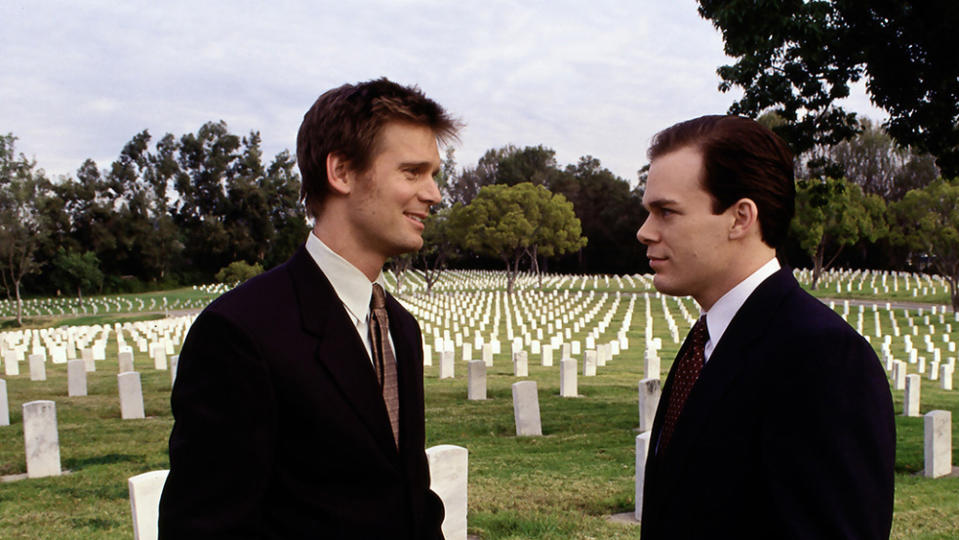
Some may argue that this series finale is the best of all time, and those final 10 minutes are definitely something to rave about. The rest of the episode that comes before, however, is just fine. Serviceable as it was, given that in its later seasons, the show had devolved into a joyless parade of misery for its characters. In the series-ender, the Fisher family is still in transition, grieving for the death of eldest son Nate (Peter Krause) from two episodes prior while setting up Claire (Lauren Ambrose) to seek out her uncertain future in Los Angeles.
Ah, but then we get to those 10 minutes. Those final, glorious, innovative, and devastating 10 minutes. As Claire heads West, she listens to Sia’s “Breathe Me” in a beautiful moment of diegetic synergy, which provides the soundtrack to a series of flash-forwards that reveal how the rest of the Fisher family and loved ones live out their days. While joyous milestones are glimpsed, what’s so striking are the deaths. Yes, everybody dies in real life, but rarely do we get to see how our favorite fictional characters fall victim to such a grim, inevitable fate en masse. One by one, as each familiar face goes slack, our hearts break just a little bit more. It’s as perfect a coda as anyone could’ve wished for, and it changed how viewers and the TV industry thought of what a finale could do.
2. “Friday Night Lights”
The final state championship game was unlike any other we’d seen. Instead of taking the play by play approach during the game, the episode elected to focus on the faces of the players, the coaches, and the crowd. That stylistic choice made it clear that the show was ultimately really not about football. It was about a community that banded together through thick and thin, appreciating and loving each other no matter the cost. From Julie telling her parents that they were her inspiration to Eric asking Tami to take him to Philadelphia with her, “Always” reminded us that the strengths of family and community always outweighed mere winners and losers. In the words of the immortal Coach Taylor: “Clear eyes, full hearts…eh, we’ll deal with that later.”
1. “Mad Men”
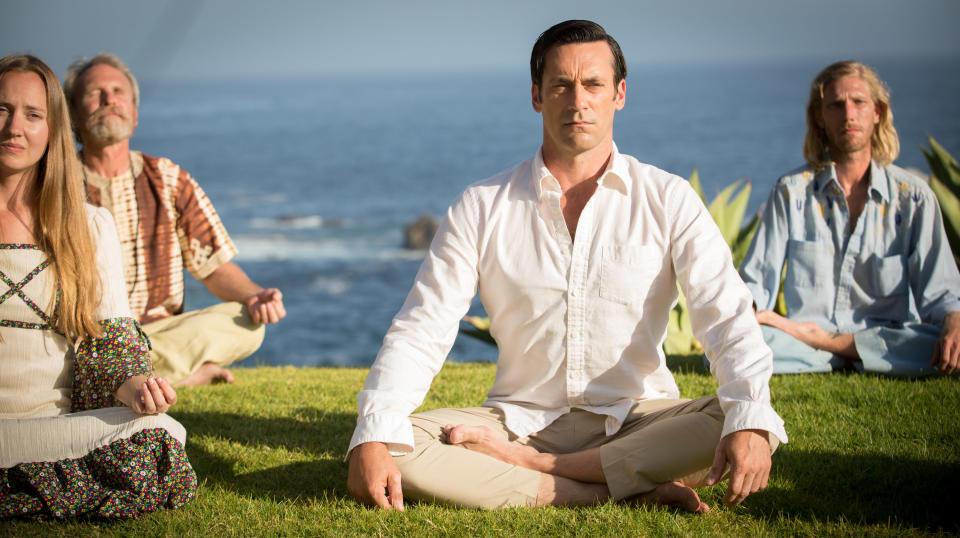
“Mad Men” is a fascinating case study in closing out a series. In many ways, Don Draper‘s world had already ended many times over by the time the show was ready to air its last episode. So instead of a final episode that focused solely on tying up loose ends or giving characters a swell sendoff, “Person to Person” was also focused on writing the prologue to a new chapter that we’ll never see: Peggy and Stan on the verge of a potential new life together, Betty with a dignified end to hers, and Sally beginning to wrestle with her teenage years born out of a pre-empted childhood. Leonard’s refrigerator speech, almost smiling through tears and gritted teeth, gave Don the chance to experience what he afforded to so many others throughout his career. As “Mad Men” had outlined so many times before, happiness and despair and want and desire are so often manufactured by people you will never meet, a creation of men who gave themselves their own collective nickname. Maybe for Don Draper, that zen smile is an elusive sense of fulfillment. Or perhaps it’s the cynical realization that his brand of bliss could be commodified on a global scale. Credit one of the all-time great TV series for giving a lasting finale where both are possible.
Sign Up: Stay on Top of the Latest TV News! Sign Up for our TV Newsletter Now
Best of IndieWire
Sign up for Indiewire's Newsletter. For the latest news, follow us on Facebook, Twitter, and Instagram.
Solve the daily Crossword

